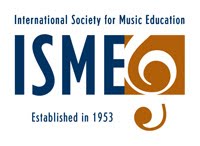Dramatic reduction imminent for music in New Zealand one year teacher training
I 'play' ~ with 7
For children's sake, draw back hammer, pick, bow or diaphragm in readiness for meaning far deeper than research.
Let children speak in music, synapse 'click', their beings flow
I play and I dream, and I see good about me. When I play music I am within and outside the most productive me.
When I move in my music, I am rhythms of the world, its cultures, personification of codes and knowledge through genre-ridden sounds of olden times and freshest mode.
As I numerate it is rhyme, and when I interpret physical landscapes they are emboldened as sounds familiar to heart and mind, just as jammers and improvisers encapsulate, time over time.
When I take up a pencil for sketching plan of house or cloth, I happily fall to forms of music and understandings of strictures, thrusting negotiated space(s), surprising ends, elongated phrase, and textured design.
When I gauge complexities of another's harmony, be it cultural or soft wear, grudgingly at times, I can acknowledge reciprocity through music's creative wiles; begin with Pythagorean logic.
New people are intuitively understood as multiple tone colours, degrees of colour façade and expression as dynamic relationship unfolds. As drama plays on stage, city-street, or in political chamber hear textures of people weave and juxtapose as melody. Their nuance, garb and utterance blended as telephone wires in howling storm, or the tranquillity New Zealand bird songs enriching already sumptuous podocarpaceae.
The skill as musician matters not, just know my being is most vibrant when music speaks and calls at me through act of playing. Music, demonstrably my most potent thought resource provokes expression to words and number, so that more might understand alternative realities.
The point.
Heavy the collar and shame from current intent to soon tick off unsound manifestation of student musical growth as
7.
Seven hours of voice to share 'I play', to empower the art with those emerging, a nation's teachers.
What is the hope? There is no need to beguile community or child by 7, gained through opaque lens of 'I play' in learning, life and being. Speak out as guardians of life empowering music, beyond 7.
A postlude for those who will decide!
Walk and listen. It will likely be no more than 300 paces before a music will assail, lift your spirit, calm a deepest fear. You may not play as some, but ponder the wellbeing on every pavement in our nation's future. What new and old musics might give rise to pride?
It need not be 'Ctrl Alt', or '⌘' delete from just 12 to 7!
Dr Errol Moore
Senior Lecturer: University of Otago College of Education
Chair: Music Education New Zealand Aotearoa
Board Member: Australia and New Association of Music Education Research
What can you do
in seven hours?
Read the latest Dan Brown blockbuster novel.
Watch a stew cook in a slow cooker.
Sit on an aeroplane taking you to Perth.
Get a good night's sleep.
And, apparently,
learn how to teach music to schoolchildren.
Whoa!
Someone's got to be kidding!
Music doesn't matter.
"That's why, in New Zealand, we don't go to Classical Music concerts."
Except that 12% of the population does go to Classical Music concerts.
"That's why, in New Zealand, we don't go to Popular Music Concerts."
Except that 1/3 of the population does go to Popular Music Concerts.
"That's why we don't go to performances of opera or music theatre."
Except that 23% of the population does go to performances of opera or music theatre.
"That's why we don't spend money on music."
Except that we spend $2.8 million a week, $145 million a year on music.
Music doesn't matter.
That's why 7 hours training is enough to help our teachers develop musical skills and understanding in our children.
It's obviously what the community wants.
Data from A Measure of Culture: Cultural experiences and cultural spending in New Zealand. Statistics NZ and Ministry for Culture and Heritage, 2003
QUESTION:
How long would it take to train someone to teach an untranslatable language to New Zealand schoolchildren?
Well, let's see. . . .
Mmm. . . .
Obviously, enough time for the person to learn and understand the language herself. . .
Obviously, enough time for the person to develop skills appropriate to this difficult task. . .
Maybe four or five years?
Three years if she's really bright and talented?
WRONG!
Hey, we can do it here at Otago
in SEVEN HOURS!
The language is music.
Blair Professor: John Drummond
Past Chair: International Society of Music Education and Music Education New Zealand Aotearoa





